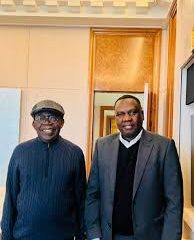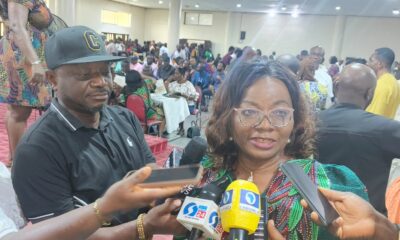Editorial
As Rivers LG Election Aproaches…

Barring any inhibiting circumstances, the Rivers State Independent Electoral Commission (RSIEC) will conduct the state local government election on October 5. Charged with this onerous task, RSIEC must engage in a meticulous orchestration of events, strategies, and implementations to ensure the polls pass off without a hitch. Regrettably, the conspicuous silence and apparent inertia of the electoral body have become sources of consternation for the people.
The success of any election hinges on the groundwork layed before actual polling. Hence, RSIEC must undertake a comprehensive planning. A fastidious approach to voter registration and the maintenance of a credible voter register are fundamental. The commission must ensure that eligible voters are not disenfranchised following administrative oversights or technical glitches. In a healthy democracy, voter engagement is not merely a suggestion but a necessity. It is the lifeblood that sustains the very fabric of a political system.
Central to this engagement is a profound sense of security among voters that their voices will be heard and their choices will be respected. When voters feel secure in their right to vote, they are more likely to participate in the electoral process. Therefore, in the forthcoming local government election, RSIEC must prevent voter suppression and make voters believe that they will not be prevented from casting their ballots.
Additionally, the state electoral commission ought to ramp up voter education programmes. An electorate that is well-educated about the procedural aspects of the voting process is less likely to encounter disenfranchisement because of ignorance or misinformation. Furthermore, the commission must emphasise the importance of non-violence and peaceful conduct during the election period.
Recruitment and thorough training of electoral officers are essential for ensuring a successful election. RSIEC must instil integrity and professionalism in its ad hoc staff, as these individuals play an essential role in upholding the election’s credibility. Equipping them with the necessary skills and ethical guidelines can foster a transparent electoral environment.
The logistical aspect cannot be understated. Proper preparation would involve ensuring the timely distribution of voting materials, functional voting equipment, and the optimal location of polling units. The accessibility of these units for people with disabilities must also be a consideration to enhance inclusiveness in the democratic process.
Election periods are notoriously fraught with tension and Rivers State is no exception, especially in light of the current political crisis. It is non-negotiable that adequate security measures are put in place to forestall any form of electoral violence or malpractice that could jeopardise the probity of the exercise. Collaboration with various security agencies will be momentous. RSIEC must work in concert with the police force, civil defence, and possibly the military, especially in areas identified as hotspots for electoral unrest.
Security personnel deployed for election duties must discharge their responsibilities impartially, without succumbing to the whims and caprices of political actors. Ensuring the sanctity of the ballot must be RSIEC’s cardinal goal. As such, protecting the vote from manipulation – both digitally and physically – becomes imperative. Measures including but not limited to the use of secure ballot boxes, tamper-evident seals, and transparent vote tallying processes should be a part of the commission’s strategy.
Upon the conclusion of voting and counting, the prompt announcement of results will assist in maintaining calm and order. The state electoral body must commit to transparency throughout the entire electoral process. Transparent handling of the election outcomes will boost confidence in the electoral body and decrease the likelihood of disputes. Civil society groups and election monitors could be engaged to ensure credibility.
Nevertheless, it is plausible that disagreements will arise. Thus, the state judicial authorities should begin to set protocols for handling election grievances. Clear guidelines that detail the pathways for legal redress and a commitment to honouring the outcomes of any judicial processes will enhance the plausibility of the electoral process.
Compliance with the state electoral law is obligatory in maintaining the legitimacy of the process. Any deviations from the prescribed procedures and regulations can undermine the validity of the results. Therefore, it is incumbent upon all parties involved to familiarise themselves with the legal framework governing the electoral process and to ensure strict adherence to its provisions to promote an election that truly reflects the will of the people.
All political parties must be treated equally. This could foster an environment of inclusivity. Equal access to information should be guaranteed. This is not merely a procedural necessity; it is a fundamental principle that upholds the integrity of elections. When all political parties are properly informed and engaged, the electoral process becomes more robust, reducing the potential for disputes and fostering a healthier political climate. Ultimately, equitable treatment by the umpire is vital for genuine democratic participation.
The Rivers State Government must give precedence to the adequate allocation of funds necessary for the elections for a smooth and transparent electoral process. Proper financing is necessary not only for logistics support, such as polling station setup and staff training but also for maintaining the integrity of the electoral system and the payment of adhoc staff. Investing in these resources can foster civic participation. Moreover, a well-funded election can help mitigate potential conflicts and irregularities.
Citizens and observers are keeping a careful eye on the polls preparations as they progress. The success of the election could set a positive example for electoral integrity not only in the state but in the country as a whole. RSIEC’s actions will determine if it is merely an administrative body or a true protector of democracy. If the commission focuses on meticulous planning and unwavering dedication, it can make certain that the election sets the bar for future polls and demonstrates the resilience of Nigeria’s democratic system.
Editorial
UNIPORT @50: Celebrating Excellence

The University of Port Harcourt’s Golden Jubilee celebration, which commenced on 21st July, was concluded yes
terday. With the theme “Celebrating 50 Years of Excellence,” the week-long event offered a reflective look at the institution’s extraordinary transformation—from its humble beginnings in 1975 as a budding academic centre to its present status as a symbol of scholarly excellence in Nigeria and beyond. Founded by the Federal Government as University College, Port Harcourt, it attained full university status in 1977, true to its guiding motto, “For Enlightenment and Self-Reliance.”
This institution has been instrumental in shaping Nigeria’s educational landscape. Its leadership journey began with the pioneering efforts of its first Vice-Chancellor, Professor Donald Ekong, who served from 1977 to 1982. During his tenure, he established the academic foundation and values that have continued to guide the university. Successive administrations have built upon this legacy, with the current Vice-Chancellor, Professor Owunari Georgewill, carrying the torch of visionary leadership.
Over the past five decades, the University of Port Harcourt (UNIPORT) has blossomed into a veritable melting pot of disciplines, celebrated for its impressive research output and unwavering contributions to national development. What began in 1977 with a modest six schools evolved into a full-fledged faculty system by 1982, a strategic shift designed to accommodate its expanding academic programmes and swelling student population. This transformation is a testament to the university’s ability to move with the times and keep its finger on the pulse of higher education.
UNIPORT was established during a period when the nation’s leaders recognised the pressing need to widen access to tertiary education. Its founding vision was not simply to churn out graduates, but to cultivate thinkers, innovators, and nation-builders. Through thick and thin, the institution has remained steadfast to this noble mission, undeterred by the challenges that have inevitably come its way.
The university’s commitment to fostering goodwill with its host communities, such as Choba and Aluu, speaks volumes. Recent visits by the Governing Council, under the leadership of Senator Mao Ohuabunwo, highlight a hands-on approach to building bridges and strengthening these crucial relationships. After all, maintaining a strong social licence to operate is no walk in the park and requires constant effort and engagement.
UNIPORT’s pursuit of academic excellence has not gone unnoticed on the international stage. In 2015, the university pulled off a remarkable coup when “Times Higher Education” ranked it sixth in Africa and first in Nigeria – a feather in its cap and a clear endorsement of its commitment to quality education, ground-breaking research, and innovation. This accolade has firmly cemented its standing among the continent’s foremost academic powerhouses.
Its research achievements have been nothing short of transformative, particularly in fields such as health, petroleum exploration, and environmental sciences. The trailblazing innovations of the Central Instrument Laboratory, showcased during World Laboratory Day 2025, underline its critical role in pushing scientific boundaries. Today, its reputation as Nigeria’s top research institution stands as incontrovertible proof of its intellectual mettle.
Since July 2021, the university has been under the astute leadership of Professor Georgewill, whose tenure has been marked by far-reaching initiatives aimed at raising the bar in academics, research, and community service. His administration has been keen to leave no stone unturned in enhancing the university’s global profile.
With 14 faculties and more than 60,000 students, UNIPORT has produced an army of distinguished graduates – from Masters and PhD holders excelling worldwide to public figures of national prominence. Among its illustrious alumni are former President Goodluck Jonathan, ex-Rivers State governors Chibuike Amaechi and Nyesom Wike, as well as Abia State Governor Alex Otti. The Theatre Arts Department has also given Nigeria some of its brightest Nollywood stars, including Rita Dominic, Sam Dede, and Hilda Dokubo, who have all added rich hues to the country’s cultural tapestry.
The university’s legacy is further enriched by the scholarship of eminent academics such as Professor Ebiegberi J. Alagoa, renowned historian and former vice-chancellor, Professor Kelsey Harrison, the acclaimed gynaecologist and former vice-chancellor, and the late intellectual giants, Professors Ola Rotimi, Kay Williamson, Nimi Briggs, and Claude Ake. Their enduring contributions have ensured UNIPORT remains a cradle of intellectual brilliance.
Yet, it would be remiss to ignore the hurdles ahead. Infrastructure development, though ongoing, often feels like watching paint dry. The Senate Building’s relocation from Delta Park to University Park marks some progress, but facilities such as the crumbling University Crab and the overstretched teaching hospital are crying out for attention. A shortage of lecture halls, classrooms, and hostels continues to hamper the learning experience. The golden jubilee is, therefore, a golden opportunity to tackle these gaps head-on and set UNIPORT on a path to global prominence.
As this Ivory Tower celebrates its 50th anniversary, it must also take stock and look to the future with a bold vision. To climb the global university rankings, it needs to invest strategically in world-class research, digital education, and international collaborations with top-tier institutions.
We call upon the Federal and Rivers State Governments, corporate organisations, and public-spirited individuals to rally behind UNIPORT’s renewal. A university that has shaped leaders of national and global stature should not be left to make bricks without straw; it deserves robust financial and infrastructural backing.
On this historic milestone, we heartily congratulate the University of Port Harcourt for half a century of service to Nigeria and humanity. The next fifty years should be marked by audacious ambitions, cutting-edge innovation, and an unrelenting pursuit of excellence. Here is to a golden past and an even brighter future, the best, as they say, is yet to come!
Editorial
Benue Killings: Beyond Tinubu’s Visit

The recent massacre in Yelewata, Benue State, ranks among Nigeria’s deadliest attacks of
2025. While official figures put the death toll at 59, media reports and Amnesty International estimate between 100 and 200 fatalities. This atrocity extends a decade-long pattern of violence in Nigeria’s Middle Belt, where Beacon Security data records 1,043 deaths in Benue alone between May 2023 and May 2025.
President Tinubu’s visit on 18 June—four days after the 14 June attack—has drawn sharp criticism for its lateness. This delay echoes a history of inadequate responses, with Human Rights Watch documenting similar inaction in Plateau and Kaduna states since 2013, fuelling a culture of impunity. The attack lasted over two hours without meaningful security intervention, despite claims of swift action.
The violence bore hallmarks of genocide, with survivors recounting systematic house burnings and executions. More than 2.2 million people have been displaced in the region since 2019 due to comparable attacks. Data show Benue’s agricultural output falls by 0.21 per cent in crops and 0.31 per cent in livestock for every 1 per cent rise in violence.
Security forces continue to underperform. No arrests were made following the Easter attacks in April (56 killed) or May’s Gwer West massacre (42 killed). During his visit, Tinubu questioned publicly why no suspects had been detained four days after Yelewata, highlighting entrenched accountability failures.
The roots of the conflict are complex, with climate change pushing northern herders south and 77 per cent of Benue’s population reliant on agriculture. A Tiv community leader described the violence as “calculated land-grabbing” rather than mere clashes, with over 500 deaths recorded since 2019.
Government interventions have largely fallen short. The 2018 federal task force and 2025 Forest Guards initiative failed to curb violence. Tinubu’s newly announced committee of ex-governors and traditional rulers has been met with scepticism given the litany of past unkept promises.
The economic fallout is severe. Benue’s status as Nigeria’s “food basket” is crumbling as farms are destroyed and farmers displaced. This worsens the nation’s food crisis, with hunger surges in 2023-2024 directly linked to farming disruptions caused by insecurity.
Citizens demanding justice have been met with force; protesters faced police tear gas, and the State Assembly conceded total failure in safeguarding lives, admitting that the governor, deputy, and 32 lawmakers had all neglected their constitutional responsibilities.
The massacre has drawn international condemnation. Pope Leo XIV decried the “terrible massacre,” while the UN called for an investigation. The hashtag “200 Nigerians” trended worldwide on X, with many contrasting Nigeria’s slow response to India’s swift action following a plane crash with similar fatalities.
Nigeria’s centralised security system is clearly overwhelmed. A single police force is tasked with covering 36 states and 774 local government areas for a population exceeding 200 million. Between 2021 and 2023 alone, 29,828 killings and 15,404 kidnappings were recorded nationally. Proposals for state police, floated since January 2025, remain stalled.
Other populous nations offer alternative models. Canada’s provincial police, India’s state forces, and Indonesia’s municipal units demonstrate the effectiveness of decentralised policing. Nigeria’s centralised structure creates intelligence and response gaps, worsened by the distance—both physical and bureaucratic—from Abuja to affected communities.
The immediate aftermath is dire: 21 IDP camps in Benue are overwhelmed, and a humanitarian crisis is deepening. The State Assembly declared three days of mourning (18-20 June), but survivors lack sufficient medical aid. Tragically, many of those killed were already displaced by earlier violence.
A lasting solution requires a multi-pronged approach, including targeted security deployment, regulated grazing land, and full enforcement of Benue’s 2017 Anti-Open Grazing Law. The National Economic Council’s failure to prioritise state police in May 2025 represents a missed chance for reform.
Without decisive intervention, trends suggest conditions will worsen. More than 20,000 Nigerians have been killed and 13,000 kidnapped nationwide in 2025 alone. As Governor Hyacinth Alia stressed during Tinubu’s visit, state police may be the only viable path forward. All 36 states have submitted proposals supporting decentralisation—a crucial step towards breaking Nigeria’s vicious cycle of violence.
Editorial
Responding To Herders’ Threat In Rivers

-

 Sports4 days ago
Sports4 days agoWTT: Lind Praises Lagos fans, vows to return
-

 Niger Delta4 days ago
Niger Delta4 days agoD’Gov Lauds Intervention Programmes Of CCN
-

 Sports4 days ago
Sports4 days agoInjured Salgado thanks Falcons for support
-

 Politics4 days ago
Politics4 days agoTinubu Healthier Than Most Leaders In Developed Countries – Bwala
-

 Sports5 days ago
Sports5 days agoNigerian wins British Irish Para Badminton Int’l
-

 News4 days ago
News4 days agoShippers Council Boss Cautions Industries on Container Deposits Refunds.
-

 News4 days ago
News4 days agoOSPAC Boss Sues For Peace
-

 News4 days ago
News4 days agoRivers Verification Exercise ‘ll Flush Out Ghost Workers -HoS … Allays Fear Of Salary Delay


